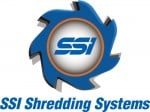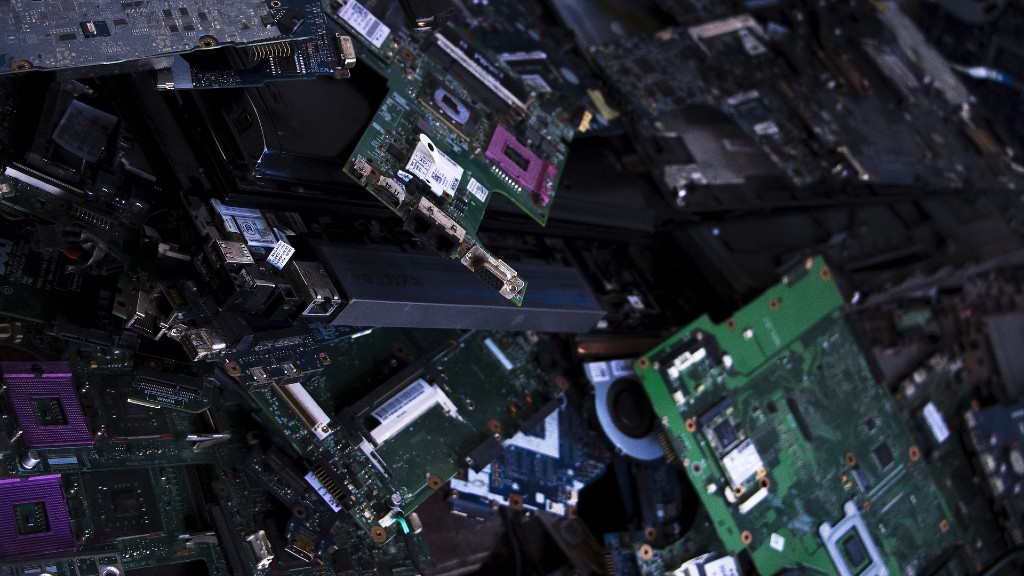SSI shredders key to KW Plastics' recycling of the equivalent of 3.5 billion plastic bottles every year
Application tailored shredders meet the ever-changing needs for specific material streams
Long before circular economy and sustainability were industry-wide catch phrases, KW Plastics in Troy, Alabama was at work creating a market and value for commonly discarded recyclables.
Founded in 1981 by owners Kenny Campbell and Wiley Sanders, KW Plastics boasts the world's largest capacities to process recycled resin. Initially, the company recycled used automotive battery casings, providing a high quality polypropylene resin with tremendous cost savings back to the casing manufacturers.
As the company expanded its operations, KW Plastics began to consider other resins and the potential value of readily available packaging that was being thrown away.
In 1993, KW Plastics opened its recycling division across the street from its headquarters to recycle postconsumer high-density polyethylene (HDPE). The transition was a natural one for the company, as the processes required to recycle HDPE were similar in scope to those required to recycle polypropylene.
Scrap material poured into KW Plastics' recycling plant as communities and businesses began to realize the financial and environmental benefits of sorting and selling recycled materials, making the decision to invest in newer and more advanced equipment an easy one for Campbell. Looking for shredders to more efficiently process its incoming waste stream, Campbell turned to Wilsonville, Oregon-based SSI Shredding Systems, Inc. to meet its growing demand.
The company initially purchased three SSI Dual-Shear shredders to run at the front of its shred lines. A 100 HP 1600E system and two 200 HP systems. These slow-speed, high-torque, two-shaft, rotary shear shredders were designed to efficiently process difficult materials using a series of counter-rotating knives that help convert incoming plastics into more manageable sizes.
Although one of the original 1600E models is still installed on one of KW Plastics' main production lines, as the company evolved, so did its shredding needs. Over the years, KW Plastics has worked with SSI to develop application tailored shredders that meet the ever-changing needs for its specific material stream.
"We have changed configurations and models over the years as KW Plastics' needs and preferences changed," David Wilson, technical sales at SSI, says. "As the company has expanded into some new applications, they added additional shredders as they've gone along."
In addition to the 1600E model, KW Plastics runs two larger 200 horsepower Dual-Shear systems that are similar to SSI's model M120E shredder. Most recently, KW Plastics installed two model M140EDSD shredders, each with a 75-inch by 45-inch cutting chamber, infeed hopper rams and the company's patented Smart Feed technology. The Smart Feed technology allows KW Plastics to process challenging materials at high volumes with efficient electric drives.
Three of the company's wash lines are set up to run about 10 tons per hour, a smaller line runs about 4 to 5 tons per hour, and the company also runs a woven line.
According to Campbell, the versatility of SSI's machines and their ability to be adapted to KW Plastics' unique applications were some of the main selling points that have led to the two companies' longstanding partnership.
"Our wash lines are able to run very high-volume rates, very efficiently, and that's how we're able to keep our costs down, and our SSI equipment plays a very big role in helping us do that," Campbell says. "We originally looked at all the shredders that were available, but we chose SSI because they offered the best shredder for our applications. They also were very open to working with us to develop the shredder that best fit our particular applications, whereas the other companies had their shredders, but they were one-size-fits-all and they weren't capable or willing to change or modify their offerings to better meet our needs."
Meeting the challenge
According to Wilson, SSI has worked to develop the capacity of its shredders to keep up with the evolution of KW Plastics' needs.
"After running our equipment for 25 years, perhaps the features that KW Plastics values today are different than they were originally," Wilson says. "In the early years, the key features were items such as our bearing protection, shock protection and our simple heavy-duty design and construction methods. Over the years, though, they have gained a great deal of experience processing plastics. The people at KW Plastics are always thinking about ways to improve their process, and the SSI shredders by design are very configurable. KW Plastics takes advantage of this. For example, the cutter design they started with is nothing like the cutter configurations they use today. It is the people at KW Plastics and the team at SSI that work together to tailor the system to the application."
One such example of this collaborative process was when KW Plastics came to SSI in 2010 looking to expand its offerings to include a super-sack-like material.
"They brought us a challenge in 2010 when they wanted to expand into material like super-sacks," Wilson says. "Conventional off-the-shelf shredder technology would never adequately process such a challenging material at sufficient volumes to be acceptable to KW Plastics, but SSI had recently developed the patented Smart Feed Electric Drive technology which allowed us to process certain materials in new ways, without hydraulics. We combined our expertise on this new shredder technology with recommendations they had as far as the cutter configuration, and the result worked right out of the gate."
Besides designing its shredders for KW Plastics' unique needs, Wilson says SSI is constantly innovating to meet the needs of the general market. One such design that SSI has introduced that has made it easier for KW Plastics to process its material are the ram hoppers included on its shredders.
The ram hopper is an optional device on the top of the shredder that serves multiple purposes. Some large bulky plastic containers can float on top of the cutting chamber and not process as efficiently as other materials. The ram hopper solves the problem by pushing the problematic material into the cutters, which increases KW Plastics' production capacity. The ram hopper is also a good "bridge breaker", if the plastic is having difficulty reaching the cutters, the ram can break up this material and force it into the cutters. The design is such that the operation is automatic, allowing KW Plastics to load material on top of the ram when it is in the down position, which has made it easier to aid in production.
Taking on the tough jobs
Besides SSI's ability to modify its line of shredders to suit KW Plastics' needs, the overall durability of the equipment has been one of the most notable selling points of the company's shredders, according to KW Plastics General Manager Scott Saunders.
"I like our shredders because they can handle contamination that other shredders aren't able to handle," Saunders says. "With recycling, you expect to buy a segregated bale, but many times, there are contaminants such as metal, or big pieces of wood and other things in the bale that aren't supposed to be there. The SSI shredder doesn't self-destruct, for lack of a better term, when those things hit the machine. It will reverse itself and allow us to continue our processes."
The ability of these shredders to withstand foreign materials in the waste stream is born out of SSI shredder's heavy-duty design, Wilson says.
"The SSI equipment is at the front of the line. The first machine in the line takes all the abuse, which means it will not only be processing plastic, but anything and everything else that is mixed in with the plastic. This includes metal that could destroy some types of shredders," Wilson says. "All the SSI slow-speed Dual Shear shredders are built like a tank. The M140 models, for example, are over 20 tons each. Plus, all the KW Plastics' SSI shredders have a patented shock protection system that is designed to protect the system from damage when the ‘bad stuff' drops into the shredder. The cutters are heavy duty and can take abuse. The equipment just keeps on going, year after year."
Even in the face of constant abuse, Campbell says maintaining the company's shredders takes a minimal amount of time and effort.
"Our shredders routinely see all types of foreign materials, even metal of all different shapes and sizes, including solid metal shafts, but the shredders are very robust and the cutter blades are very tough. They can take extreme abuse and still function normally," Campbell says.
This durability has translated into decreased downtime for the company.
Campbell says, "Other than scheduled cutter changing, the shredders run uninterrupted. I would say we enjoy an uptime greater than 99 percent."
Besides the decreased downtime, SSI shredders are also designed to help reduce the chance of fires and dust exposure, which translates to a cleaner, safer workplace for KW Plastics.
"The chance of fire is very low when processing with the SSI slow-speed shredder," Wilson says. "There are several reasons for this. The slow-speed rotation of the cutters results in low friction and low heat when processing most materials, including metals and nonshreddables. Between each cutter is a cleaning finger that is designed to keep material from wrapping the shaft, this helps keep the cutting chamber clean, reducing the chance of material buildup. The system also produces very little dust or fines. The slow-speed cutting technology is hard to beat for environmentally friendly processing."
Closing the loop
What started as a small business looking to help keep plastics out of landfill more than three decades ago has evolved into a world-class operation that is setting an industry benchmark for its output.
KW Plastics and SSI first partnered in 1993 with three shred lines. But through its investment in equipment and willingness to consistently finetune its processes, KW Plastics has been able to achieve unmatched processing capacity.
"When I started, we were a very small recycler with big dreams, and we've been able to grow to become the largest recycler of plastics in the U.S., and as far as I know, the world," Saunders says.
The company currently has more than 100 million pounds of silo capacity and the equipment needed to process more than a billion pounds annually.
Today, KW Plastics processes the equivalent of 3.5 billion plastic bottles annually—that's enough bottles to go to the moon and back again every year.
While being on the cutting edge of the recycling industry has helped KW Plastics establish itself as a world leader, Campbell says one of the most gratifying aspects of his job is helping do something good for the environment.
"It's a lot of fun—you take something that has reached the end of its service life and has been discarded and you're able to keep it from being disposed of in landfills and provide another alternative, which is the reclaiming of the materials and introducing it into another consumer product," Campbell says. "It kind of closes the loop a little bit—[the material cycle] goes round and round."




